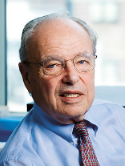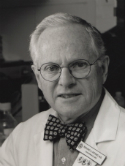Induced differentiation of erythroleukemia cells by hexamethylene bisacetamide: A model for cytodifferentiation of transformed cells Journal Article
| Authors: | Marks, P. A.; Rifkind, R. A. |
| Article Title: | Induced differentiation of erythroleukemia cells by hexamethylene bisacetamide: A model for cytodifferentiation of transformed cells |
| Abstract: | There is considerable evidence that malignant transformation need not eliminate the potential for a cell to express its developmental capabilities. This review explores the process whereby polar compounds, hexamethylene bisacetamide (HMBA) in particular, induce murine erythroid leukemoid cells (MEL) to express the differentiated erythroid phenotype, including hemoglobin production and cessation of cell division. This is a multi-step process which, although the mechanisms of action of HMBA are not yet fully understood, is amenable to experimental definition and analysis. Early effects, including changes in protein kinase C activity, in ion transport, and in expression of certain nuclear proto-oncogenes, have been examined in relation to the onset of terminal cell differentiation. This experimental experience has formed the context for initiating preliminary clinical studies designed to examine the pharmacology of HMBA and to explore its potential for modifying the natural history of cancer. |
| Keywords: | nonhuman; animal cell; phenotype; proto oncogene; gene expression; cell differentiation; animalia; cell culture; cell transformation; globin gene; murinae; phase 1 clinical trial; drug therapy; protein kinase; book; ion transport; hexamethylenebisacetamide; human; erythroleukemia cell |
| Journal Title: | Environmental Health Perspectives |
| Volume: | 80 |
| ISSN: | 0091-6765 |
| Publisher: | US Department of Health and Human Services |
| Date Published: | 1989-03-01 |
| Start Page: | 181 |
| End Page: | 188 |
| Language: | English |
| DOI: | 10.1289/ehp.8980181 |
| PUBMED: | 2647479 |
| PROVIDER: | scopus |
| PMCID: | PMC1567625 |
| DOI/URL: | |
| Notes: | Review -- Export Date: 14 April 2020 -- Source: Scopus |
Altmetric
Citation Impact
BMJ Impact Analytics
Related MSK Work





